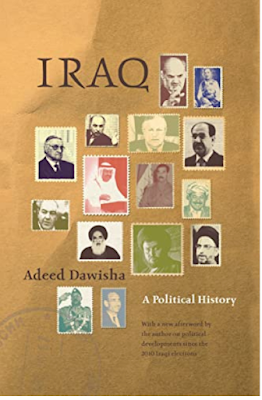Dawisha, Adeed, Iraq, A Political History from Independence to Occupation, Princeton University Press, 2009
Adeed Dawisha’s Iraq, A Political History from Independence to Occupation attempts to trace the history of the formation of the Iraqi state and its political system. He begins with the British Mandate when Iraq was created up until the middle of the U.S. occupation. His main theme is that Iraqi democracy has always been flawed.
The book begins with the problems the Iraqi government faced when it began in the 1920s. The British created a constitutional monarchy based upon its own political system but that was undermined by two major factors. First, London wanted to maintain its influence over the country so would constantly manipulate the system to achieve that. Second, the king was given wide ranging power which negated the parliament as the representative of the people. The monarchy and the prime ministers it picked to rule had a very narrow base within Iraq and were unwilling to share it with the wider public. Not only that but in the 1940s-50s the premiers became more and more authoritarian shutting down newspapers and political parties and jailing opposition leaders.
At the same time Dawisha notes that Iraq’s democracy did have its positive sides. There were always voices of dissent within parliament and sometimes they were powerful enough to force changes in laws. There was also a lively opposition in the public which despite government repression continued throughout the monarchy. The authorities would close them down but never eliminate them.
This was why the author thought Iraq’s democracy was dysfunctional. There was free expression, a lively press and opposition parties but they were constrained by a system that did not represent the people and elites who refused to share power along with an interfering foreign nation.
The book argues Iraq’s political system collapsed when a new generation arose that were unwilling to accept the status quo. First, the young and growing middle class were disillusioned with the corrupt old guard politicians who’d been in power since the 1920s. They were also closely tied to the British which the youth saw as the imperial overlords in the country. A new wave of radical Arab nationalists also emerged who were inspired by Nasser in Egypt. The Iraqi old guard were Arab nationalists as well but got their credentials from opposing the Ottomans and were against the new generation who threatened their standing. This culminated in the 1958 coup where the royal family was killed. The following rulers were autocrats which eventually gave way to the totalitarian rule of Saddam Hussein where democracy was extinguished.
The last part of Iraq focuses upon the new political system created by the Americans after 2003. The U.S. said it was establishing a democracy but institutionalized ethnosectarian quotas which was continued by the sovereign Iraqi government. Dawisha has nothing but bad things to say about this period writing that identity politics undermined any kind of national vision. Since those views were so opposed the parliament became paralyzed while violence meant the state largely ceased to exist in most of the country. The author writes that when Iraq needed a strong state more than ever to impose order and ensure security after the fall of Saddam none was to be found.
There are some problems with the author’s ideas. One is his treatment of Sunni, Shiites and Kurds. Dawisha does not fall into the trap of arguing that the two sects have always been divided since ancient times and rather says they were struggling over power in Iraq. He constantly brings up Shiite complaints about being shut out of top positions in the government by Sunnis. However when Shiites did things like join the Communist Party where ideology was more important he hardly mentions it. For Kurds he claims that they have always wanted their own nation which is disputed by other writers. The Kurds were deeply divided between tribes, chieftans and sheikhs and some historians have written that a strong sense of Kurdish nationalism didn’t emerge until the 1970s or 80s.
Finally, it was odd that Dawisha didn’t draw parallels between the British and Americans and their role in manipulating Iraqi democracy. Both wanted to maintain their power in the country and would interfere in the Iraqi government to ensure that. London for example pushed through several Anglo-Iraq Treaties which gave England control over Iraq’s military and foreign policy. Likewise the Bush administration set up three elections and a constitution after 2003 based upon American domestic politics rather than caring about Iraqis.
Overall Adeed Dawisha provides a good political history of Iraq especially for his coverage of the British Mandate and monarchy. He brings up the negatives and positives of Iraq’s early government which is often ignored by Westerners who claim Iraq had no tradition of democracy. The second half of the book is committed to how that system was destroyed by autocrats and then in his view perverted by the Americans and Iraq’s new post-Saddam parties. The book is not without its flaws but it does lay out the structural problems the Iraqi state faced over time.
Link to all of Musings On Iraq’s book reviews listed by topic





No comments:
Post a Comment